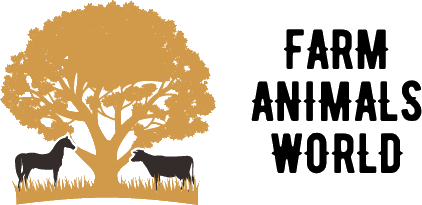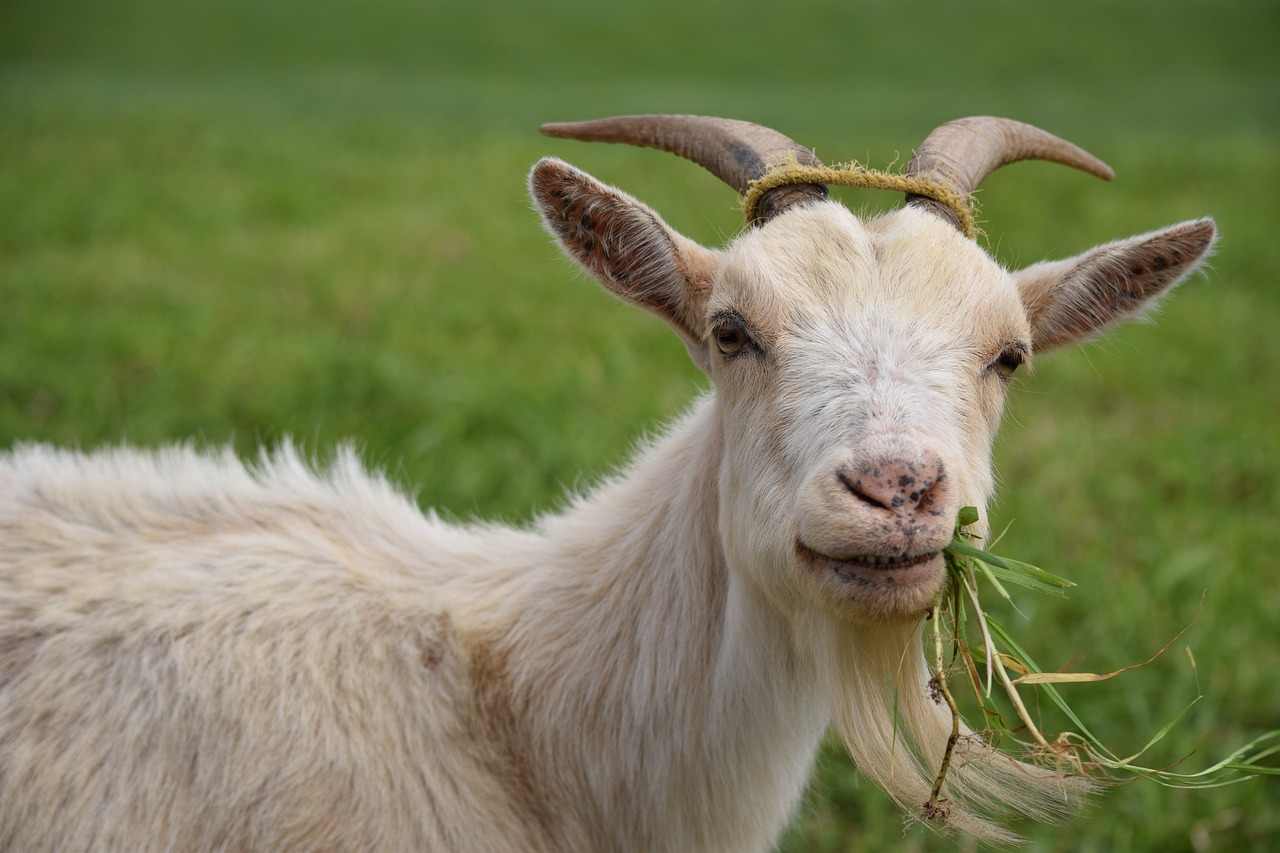You’ve heard the saying: ‘A goat will eat anything’. But can goats survive on grass alone?
This article takes an in-depth look at the dietary needs of goats and explores whether grass is enough to keep them healthy.
Learn what nutritional value grass has, the risks associated with a grass-only diet, how to incorporate other foods, and what signs of nutritional deficiency to look for.
Understanding the Dietary Needs of Goats
To understand the dietary needs of goats, it’s important to know that they can’t survive on grass alone. Goats have a specialized digestive system that enables them to consume various forage like grasses, herbs, shrubs and trees.
To stay healthy, goats need access to various forage types, as well as hay and grain, to prevent mineral deficiencies. Goats are also known for their grazing habits, but hay should be provided to supplement their diet. Hay feeding is essential to provide balance in the diet and ensure that the goats get adequate nutrition.
Therefore, it’s clear that goats need more than just grass to meet their dietary needs.
The Primary Role of Grass in a Goat’s Diet
You can provide grass to your goats, but it’s not enough for them to survive. Grass is the primary component of a goat’s diet, and it’s essential for them to get the nutrients they need. Grass also helps maintain their digestive health, mineral balance, and pasture rotation. Goats require hay forage and other supplements to supplement their grazing patterns for optimal health.
Grass is a healthy and nutrient-rich food that can help maintain a balanced diet by providing essential vitamins and minerals. However, it doesn’t contain enough protein, calcium, or phosphorus for goats, so hay forage and other supplements must be added. Additionally, providing a variety of grasses is crucial, as this helps keep their diet balanced.
To maintain the health of your goats, it’s essential to provide a balanced diet. Grass is a significant part of this diet but shouldn’t be the only source. Hay forage, minerals, and pasture rotation should all be considered when feeding your goats. With a balanced diet, your goats can stay healthy and thrive.
Nutritional Value of Grass for Goats
By understanding the nutritional value of grass for goats, you can determine if it’s enough to sustain them. Goats are well known for their foraging habits and can eat various grass types, including legumes, alfalfa, and clover.
Grass is essential for the health and development of goats as it contains vital vitamins, minerals, and fiber. To ensure a balanced diet, goats need an adequate grass intake to reap its health benefits.
The fiber from grass is also important in aiding digestion and helping goats maintain a healthy gut. Ultimately, understanding the nutritional value of grass for goats is key in helping them achieve a nutritional balance.
Risks Associated With a Grass-Only Diet for Goats
You should know the risks associated with a grass-only diet for goats.
Forage varieties can be limited, resulting in a lack of minerals and vitamins their bodies need.
Digestive issues can occur from a lack of variety and inadequate fiber.
Parasite control can be more difficult, as the parasites are often ingested with the grass.
Incorporating Other Foods Into a Goat’s Diet
If you want to ensure your goats stay healthy, it’s crucial to incorporate other foods into their diet. A goat’s diet should be balanced and nutritious to meet their needs. Goats should also have access to minerals, proteins, and grains. Commercial feeds can also be used as an additional source of nutrition.
Foraging habits should be taken into consideration, as well as the selection of hay. An owner should act as a guardian and care for their goat, ensuring their diet is adequate.
With careful consideration of foraging habits, hay selection, balanced nutrition, guardian care, and commercial feeds, you can be sure your goats are getting the nourishment they need.
Signs of Nutritional Deficiency in Goats
When caring for goats, it’s necessary to be aware of the signs of nutritional deficiency so you can take steps to ensure your goats are getting the nourishment they need. Here are the key signs to watch for:
- Poor coat condition due to inadequate fat, protein, and mineral intake
- Reduced milk production due to insufficient forage types or feed costs
- Slowed growth rate due to mineral deficiencies or inadequate protein
- Unusual grazing habits indicating poor digestion
- A deficiency in essential vitamins and minerals can increase vulnerability to diseases.
By observing these signs, you can determine if your goats are receiving adequate nutrition from grass alone or if you need to supplement their diet with other foods.
Role of Supplements in a Goat’s Diet
Understanding the role of supplements in a goat’s diet is essential for providing them with the nutrition they need. Goats are grazers, so they need access to fresh forage to maintain proper health. Hay consumption should also be part of their daily routine, along with mineral supplementation.
For forage alternatives, goats can be supplemented with grains or alfalfa cubes. It’s crucial to provide a balanced diet for goats, and supplements can help ensure they get all the essential vitamins and minerals they need.
While goats can survive on grass alone, supplements can help them get the most out of their grazing habits and hay consumption.
Case Studies: Effects of a Grass-Only Diet on Goats
You may be wondering if goats can survive on grass alone. To answer this, let’s look at the effects of a grass-only diet on goats in various case studies:
- Hay vs. grass: Goats can survive on grass alone, but hay is a better source of essential vitamins and minerals.
- Seasonality concerns: Goats must eat different grasses throughout the year.
- Foraging habits: Goats tend to forage more efficiently when given a variety of grasses.
- Pasture rotation: It’s crucial to practice pasture rotation and to give goats access to enough grass.
- Mineral supplementation: Goats need minerals to stay healthy, so mineral supplementation is important.
Frequently Asked Questions
How Often Should Goats Be Fed?
It is recommended that goats be fed a variety of grasses and forages, as well as hay and mineral supplements. Feeding should be based on the available grass varieties, hay intake, and forage options. Grazing rules should also be considered to ensure that goats receive a balanced diet.
What Other Plants Can Goats Safely Eat?
You won’t believe it, but goats can forage a wide range of plants and vegetation! Their digestive needs and grazing areas determine what plants they will select for their diet, so supplementing their diet with other plants is essential. Goats have amazing foraging habits that allow them to survive on various plants and vegetation!
What Is the Best Way to Monitor a Goat’s Health?
To monitor a goat’s health, use monitoring tools to track their grazing habits and dietary diversity. Supplement hay and provide mineral supplementation to ensure adequate nutrition. Doing so gives you the necessary data to keep them healthy.
Is there any risk involved in feeding goats excessive amounts of grass?
Too much grass can cause mineral deficiencies, reduce forage quality, and disrupt habitat selection. Without proper parasite control, goats may risk various health issues. Monitor grazing patterns to ensure your goats stay healthy and happy.
How Can I Tell if My Goats Are Getting Enough Nutrition?
To ensure your goats receive adequate nutrition, regularly maintain their lawn and provide mineral supplementation, fresh forage, and hay options. Monitor their digestive health and make sure they have access to a balanced diet for optimal wellbeing.
Conclusion
You now know that goats can’t survive on grass alone and that it’s necessary to supplement their diet with other sources of nutrition. Goats can digest a wide variety of food, but grass makes up most of their diet. Studies show that around 80% of a goat’s diet comprises grass, making it an essential part of their diet.
It is crucial to keep in mind that a well-balanced diet is vital for the health of a goat.

